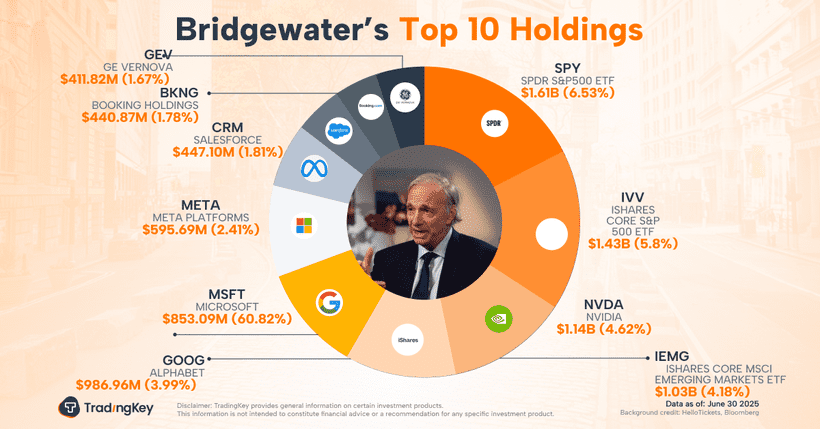Bridgewater’s Q2 Portfolio: Masterful “Sell High, Buy Low” — Exits Re-rated Chinese Stocks, Doubles Down on U.S. Tech and AI

TradingKey - After the U.S. market close on August 13, Bridgewater Associates, the world’s largest hedge fund, filed its 13F regulatory report with the U.S. Securities and Exchange Commission. The fund made significant changes to its U.S. equity portfolio in the second quarter of 2025: doubling down on U.S. AI tech giants such as Nvidia and Microsoft, while completely exiting positions in Alibaba, JD.com, and other Chinese stocks that Wall Street had previously labeled as “re-rating” candidates.
Compared to the first quarter, the value of Bridgewater’s holdings reported in the 13F form rose from $21.6 billion to $24.8 billion in Q2, partly due to its precise timing in buying U.S. tech giants at lower levels and selling Chinese stocks at higher prices for profit.
In Q2, Bridgewater increased its stakes in four of the U.S. “Magnificent Seven” tech companies — all with strong AI exposure.
- Nvidia: Increased by approximately 4,387,154 shares to 7.23 million shares, a 154% increase quarter-over-quarter, making it Bridgewater’s third-largest holding
- Microsoft: Increased by 905,622 shares to 1.72 million shares, a 112% increase, becoming the sixth-largest holding
- Meta: Increased by 381,459 shares to 810,000 shares, up 90%, now the seventh-largest holding
- Google: Increased by 2,558,097 shares to 5.6 million shares, up 84%, ranking as the fifth-largest holding
Correspondingly, these stocks performed strongly in Q2, rising 46% (Nvidia), 31% (Microsoft), 26% (Meta), and 14% (Google). Nvidia’s surge was driven by strong AI demand and a rebound opportunity after a tariff-related selloff in early April.
However, Bridgewater reduced its positions in Apple and Amazon during the quarter, whose stocks fluctuated by -8% and +15% respectively in Q2.
Apple’s last earnings showed revenue growth at a three-and-a-half-year high, but AI progress remains sluggish. Amazon beat revenue and profit expectations in Q2, but AWS growth disappointed, raising concerns about its position as the cloud leader.
If Bridgewater’s tech bets and stock performance could be seen as coincidental — given the broader market rebound on easing tariff concerns — its complete exit from Chinese stocks demonstrates remarkable timing and stock selection skill.
In the quarter, Bridgewater fully exited positions in Alibaba, JD.com, Pinduoduo, and Baidu — with JD.com being a new position added in Q1. During this period, all four stocks fell by at least 6.8%, with JD.com plunging nearly 20%.
% Change | % of Portfolio Change | Stock Price Change | |
Nvidia | +154.37% | 1.43% → 4.61% | +45.78% |
Microsoft | +111.88% | 1.41% → 3.44% | +31.32% |
Meta | +89.63% | 1.14% → 2.40% | +26.05% |
+84.08% | 2.18% → 3.98% | +14.10% | |
Alibaba | -100% | 3.47% → 0% | -12.35% |
Pinduoduo | -100% | 0.96% → 0% | -11.57% |
Baidu | -100% | 0.89% → 0% | -6.81% |
JD.com | -100% | 0.53% → 0% | -18.28% |
Source: TradingKey
Earlier this year, the emergence of the open-source AI model DeepSeek R1 sparked Wall Street enthusiasm over a “re-rating” of Chinese stocks, with Alibaba’s stock surging 56% in Q1.
The Nasdaq Golden Dragon China Index (HXC) reached its year-to-date high in mid-to-late March. Although it rebounded in Q2, it still ended the quarter down about 5%.








